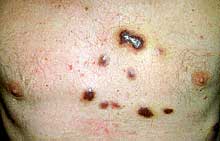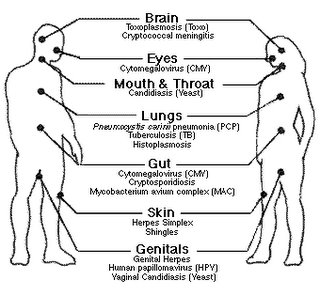HIV stands for Human Immunodeficiency Virus, which is the virus that causes AIDS (Acquired Immunodeficiency Syndrome).
The virus attacks the body's immune system, which is your defense against infections.
AIDS is the late stage of HIV infection and is life-threatening. People living with HIV may get infections such as an unusual type of pneumonia, or develop skin cancer or other types of cancers.

Kaposi's sarcoma, a type of cancer that can afflict a person with advanced AIDS
How HIV/AIDS is spread
The virus is spread through body fluids such as blood, semen, pre-semen, vaginal fluids, and breast milk.
To become infected with HIV, the virus must have a way into your body. This can occur during unprotected sex (vaginal, anal, oral) or when needles or other injecting (skin-piercing) equipment are shared.
Sharing sex toys can also spread the virus from one partner to another.
HIV is not spread by everyday social contact. Touching, hugging and shaking hands with a person living with HIV/AIDS are all safe. Insects and pets cannot spread HIV.
The disease usually progresses through four stages.
Stage 1
In the initial weeks of infection, the person experiences symptoms similar to those of glandular fever. Antibodies to the virus are usually formed at this time (3-12 weeks after infection).
Stage 2
Following infection, there is a long period during which the person has few or no symptoms, but HIV is detectable through the presence of antibodies. This period may last from 3 to 8 years after the initial infection.
Stage 3
As the virus begins to destroy the immune system, symptoms such as weight loss, fever, diarrhoea and lymph gland enlargement may commence. This stage is known as persistent generalised lymphodenopathy.
Stage 4
The full AIDS syndrome develops when the immune system is severely damaged. The person may become terminally ill with infections, cancers or neurological disorders. Forty per cent of infections progress to the full AIDS syndrome within seven years.
Stay Healthy Longer: Fight Infections
People with HIV can get many infections (called opportunistic infections, or OIs). Many of these illnesses are very serious, and need to be treated. Some can be prevented.
Below are the parts of the body that can be harmed and the medical name for each infection.

How to tell if you have HIV
A simple blood test can tell you if you have HIV. It is called the HIV antibody test.
A positive test result means that you have HIV.
A negative result means that no antibodies to HIV were found in your blood at the time of testing. Most positive tests will show up within three months of a person becoming infected with HIV.
Lower your chances of getting HIV by
* discussing HIV and other STIs with your partner(s)
* considering other things like caressing and touching instead of having sex
* both of you being tested for HIV before having sex with a new partner
* having sex only with a partner who agrees to protect both of you
* remembering not to share items that could result in the exchange of blood, semen or vaginal fluids. This includes injection, piercing and tattooing equipment, sex toys, toothbrushes and razors
How to Help Yourself
1. Go to a clinic or doctor for regular check-ups. That way, you can spot problems early and get help right away.
2. Keep your body's immune system (its defense against disease) as strong as you can. This means eating healthy foods, getting enough rest and exercise, and staying away from alcohol, cigarettes, and street drugs. It may also mean taking medicine, even when you feel well.
3. Watch for signs of infection, and report them right away. Call the doctor or clinic if you notice any of these problems:
* Diarrhea
* Cough
* Sores
* Persistent or severe headaches
* Feeling tired all the time
* Fever
* Blurry eyesight
* Vaginal discharge, burning, or itching that does not go away
* Irregular menstrual bleeding or abdominal pain that does not go away
These signs do not always mean you have an infection, but you may need tests to find out. It is important to tell the clinic nurse or doctor as soon as you have a problem.
4. Ask if you need to take medicines to prevent or delay some infections like PCP pneumonia.
5. Take medicines as directed. Do not stop taking any medicines until the doctor or nurse tell you to. If you stop taking the medicines too soon, the infection may come back and be harder to treat.
Scientists have made progress against infections linked to AIDS, and they are looking for new ways to help people with HIV stay healthy longer.
Today, many new drugs are being tested. You may be able to take part in one of these tests. If a new drug works, you may help yourself and others to fight infections better.
If you are interested, talk to your doctor or clinic nurse. Or call the numbers on the next page to find out more.
Remember:
* To help you stay healthy, be sure to go to your doctor or clinic regularly.
* Learn how to keep your body's immune system strong.
* Watch for signs of infection and call the clinic or your doctor right away if you think you might be sick.
* If you need to take medicine, be sure you know how and when to take it.








































0 comments:
Post a Comment
Please drop me a line: